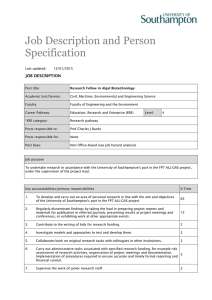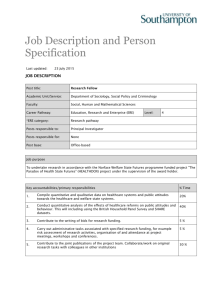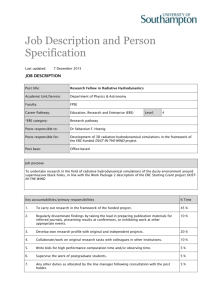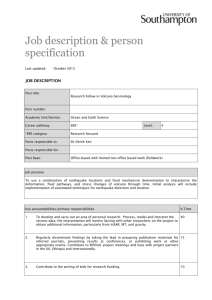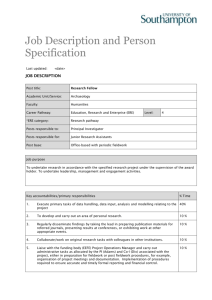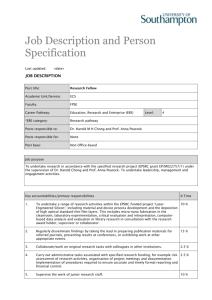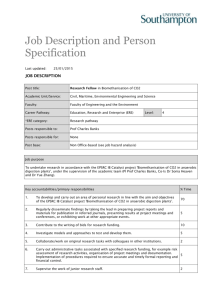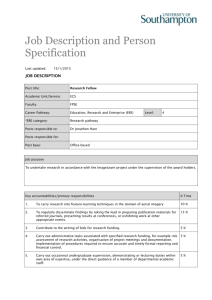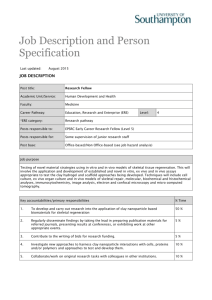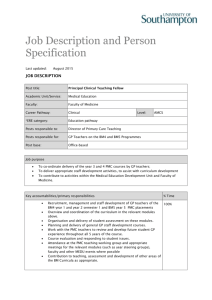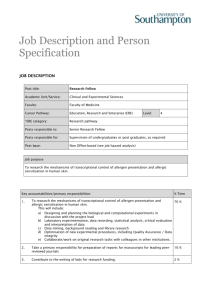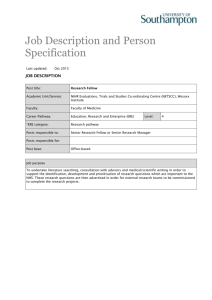Job Description and Person Specification
advertisement
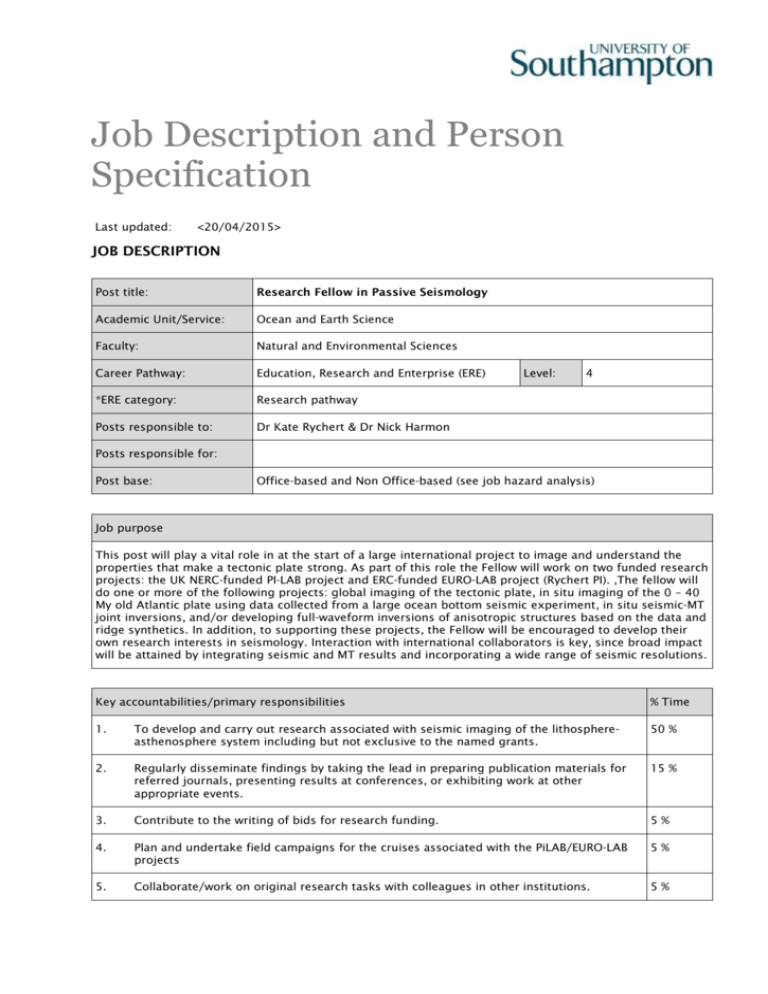
Job Description and Person Specification Last updated: <20/04/2015> JOB DESCRIPTION Post title: Research Fellow in Passive Seismology Academic Unit/Service: Ocean and Earth Science Faculty: Natural and Environmental Sciences Career Pathway: Education, Research and Enterprise (ERE) *ERE category: Research pathway Posts responsible to: Dr Kate Rychert & Dr Nick Harmon Level: 4 Posts responsible for: Post base: Office-based and Non Office-based (see job hazard analysis) Job purpose This post will play a vital role in at the start of a large international project to image and understand the properties that make a tectonic plate strong. As part of this role the Fellow will work on two funded research projects: the UK NERC-funded PI-LAB project and ERC-funded EURO-LAB project (Rychert PI). ,The fellow will do one or more of the following projects: global imaging of the tectonic plate, in situ imaging of the 0 – 40 My old Atlantic plate using data collected from a large ocean bottom seismic experiment, in situ seismic-MT joint inversions, and/or developing full-waveform inversions of anisotropic structures based on the data and ridge synthetics. In addition, to supporting these projects, the Fellow will be encouraged to develop their own research interests in seismology. Interaction with international collaborators is key, since broad impact will be attained by integrating seismic and MT results and incorporating a wide range of seismic resolutions. Key accountabilities/primary responsibilities % Time 1. To develop and carry out research associated with seismic imaging of the lithosphereasthenosphere system including but not exclusive to the named grants. 50 % 2. Regularly disseminate findings by taking the lead in preparing publication materials for referred journals, presenting results at conferences, or exhibiting work at other appropriate events. 15 % 3. Contribute to the writing of bids for research funding. 5% 4. Plan and undertake field campaigns for the cruises associated with the PiLAB/EURO-LAB projects 5% 5. Collaborate/work on original research tasks with colleagues in other institutions. 5% Key accountabilities/primary responsibilities % Time 6. Carry out administrative tasks associated with specified research funding, for example risk assessment of research activities, organisation of project meetings and documentation. Implementation of procedures required to ensure accurate and timely formal reporting and financial control. 10 % 7. Carry out occasional undergraduate supervision, demonstrating or lecturing duties within 5 % own area of expertise, under the direct guidance of a member of departmental academic staff. 8. Any other duties as allocated by the line manager following consultation with the post holder. 5% Internal and external relationships Direct responsibility to Dr Kate Rychert on the PiLAB/EURO-LAB projects. May have additional reporting and liaison responsibilities to external funding bodies or sponsors. May be asked to serve on a relevant Academic Unit committee, for example research committee. Collaborators/colleagues in other work areas and institutions. May have opportunities to go to sea as part of the seismic deployment/recovery cruises. Special Requirements To attend national and international conferences for the purpose of disseminating research results. Attend meetings with international collaborators to jointly interpret and/or invert results. Document1ERE Level 4 – Research Pathway – Research Fellow 2 PERSON SPECIFICATION Criteria Essential Desirable Qualifications, knowledge and experience PhD or equivalent professional qualifications and experience in seismology, geophysics, or related field Experience or interest in full waveform modelling, global seismology, or using ocean bottom seismic data How to be assessed CV, application & interview Experience in computing and seismic data processing. Planning and organising Able to organise own research activities to deadline and quality standards CV, application & interview Problem solving and initiative Able to develop understanding of complex problems and apply indepth knowledge to address them Application & interview Management and teamwork Work effectively in a team, understanding the strengths and weaknesses of others to help teamwork development CV, application & interview Communicating and influencing Communicate new and complex information effectively, both verbally and in writing, engaging the interest and enthusiasm of the target audience CV, application & interview Able to present research results at group meetings and conferences Able to write up research results for publication in leading peer-viewed journals Work proactively with colleagues in other work areas/institutions, contributing specialist knowledge to achieve outcomes Other skills and behaviours Understanding of relevant Health & Safety issues Positive attitude to colleagues and students Special requirements Able to attend national and international conferences to present research results Document1ERE Level 4 – Research Pathway – Research Fellow Teaching at undergraduate level and CV, contributing to teaching at application & postgraduate level interview CV, application 3 JOB HAZARD ANALYSIS Is this an office-based post? ☐ Yes If this post is an office-based job with routine office hazards (eg: use of VDU), no further information needs to be supplied. Do not complete the section below. ☒ No If this post is not office-based or has some hazards other than routine office (eg: more than use of VDU) please complete the analysis below. Hiring managers are asked to complete this section as accurately as possible to ensure the safety of the post-holder. ## - HR will send a full PEHQ to all applicants for this position. Please note, if full health clearance is required for a role, this will apply to all individuals, including existing members of staff. ENVIRONMENTAL EXPOSURES Outside work Occasionally Frequently Constantly (<30% of time) (30-60% of time) (> 60% of time) X Extremes of temperature (eg: fridge/ furnace) ## Potential for exposure to body fluids ## Noise (greater than 80 dba - 8 hrs twa) ## Exposure to hazardous substances (eg: solvents, liquids, dust, fumes, biohazards). Specify below: High Voltage Sources X Frequent hand washing Ionising radiation EQUIPMENT/TOOLS/MACHINES USED ## Food handling ## Driving university vehicles(eg: car/van/LGV/PCV) X ## Use of latex gloves (prohibited unless specific clinical necessity) ## Vibrating tools (eg: strimmers, hammer drill, lawnmowers) PHYSICAL ABILITIES Load manual handling X Repetitive crouching/kneeling/stooping X Repetitive pulling/pushing X Repetitive lifting X Standing for prolonged periods Repetitive climbing (ie: steps, stools, ladders, stairs) X Fine motor grips (eg: pipetting) Gross motor grips X Repetitive reaching below shoulder height Repetitive reaching at shoulder height Repetitive reaching above shoulder height PSYCHOSOCIAL ISSUES Face to face contact with public Lone working ## Shift work/night work/on call duties Document1ERE Level 4 – Research Pathway – Research Fellow X 4
